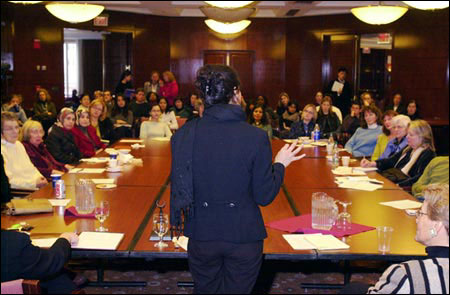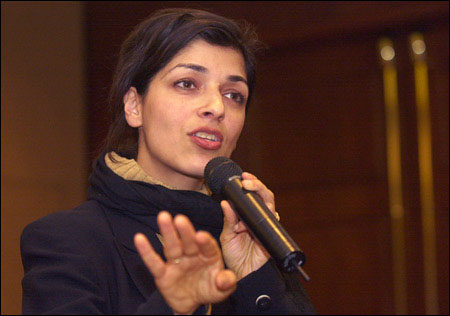Perilous time for Afghan women:
Uneven recovery efforts in Afghanistan bring as much fear as hope

The hope for a better future and a break from strife that many Afghans felt with the toppling of the Taliban regime has been replaced with the reality that a difficult climb to that future lies ahead, a climb even more difficult for Afghanistan’s women.
“It’s very muddled. It’s hard to say whether women are hurting more or are progressing more right now,” Rina Amiri, adviser to the United Nations Educational, Scientific and Cultural Organization and to the Ministry of Women’s Affairs in Kabul, said Monday (Jan. 6) at the Kennedy School of Government (KSG).
Amiri, a former senior associate for research at the Kennedy School’s Women and Public Policy Program, spoke on the plight of Afghan women during a noon event in the KSG’s Taubman Building’s fifth-floor conference room. The event was co-sponsored by the Kennedy School’s Carr Center for Human Rights Policy and the Women and Public Policy Program.
The complexity of the situation, Amiri said, has humbled her since she returned to Afghanistan last year to mobilize women and prepare for the Afghan Grand Council, or Loya Jirga – the process that selected the current Afghan government.
Amiri, who left Afghanistan at age 4 for the United States, said she felt conflicted and devastated when the United States attacked Afghanistan after the Sept. 11, 2001, terrorist attacks in New York and Washington, D.C.
“I felt destroyed within seeing that,” Amiri said. “My adopted country and my homeland were at war.”
Amiri resolved to help however she could. Her work since returning to Afghanistan, however, has made her realize that sometimes all she can do is affect one person at a time. She gave the example of a girl who was kidnapped and has been held for two years by local commanders. Amiri is working with government officials to get the girl released and helping plan how to continue to help the child once that happens.

“I feel my ability to have an impact is absolutely minuscule,” Amiri said. “If I’m able to help one life, sometimes that’s all it’s about.”
The daily lives of many Afghan women have changed little, she said. She has visited villages where women are afraid to venture outside even wearing a burka because they fear being stoned. She has visited villages where there are few women or girls over age 12, because they’ve been taken by local forces or hidden away.
But in other respects, things have changed dramatically, she said. This is the first year in a long time without war being waged in the country. The current government, which includes the first ministry devoted to women’s affairs, was elected in the first democratic elections ever held in the country, where the vote of illiterate rural dwellers counted the same as that of wealthy, influential leaders. Children returned to school in March 2002, and women in the urban areas and some rural areas are returning to the work force.
“It has been wonderful that what we thought would be the final destructive phase for Afghanistan has resulted in what it has,” Amiri said.
But that progress has occurred against a backdrop of a nation more devastated by war than any pictures can show, Amiri said. Among the basic infrastructure the nation lacks is a health care system, resulting in one of the highest mortality rates for women in the world.
With a weak central government still dependent on international security forces, warlords still hold much of the power in different parts of the country.
In this setting, Amiri has spent much of her time traveling to different villages doing what she can for women. From her discussions, she said, she understands that, despite the Taliban’s departure, Afghanistan remains essentially unchanged: a conservative, Islamic nation. Already, she said, there are the beginnings of a conservative backlash against the move toward inclusion and greater rights for women.
Afghan women are looking for basic rights and to have their basic needs met, she said, but they are not necessarily embracing Western-style feminism. She said the basic rights fall into four main categories: education, health care, economic participation, and political participation.
Strengthening the national government is an important step in achieving these rights across the country, but the national government faces many hurdles, including no working court system, no rule of law in the country, and no national army. It is also facing an Afghan tradition of weak central governments balanced by strong tribal affiliations and pockets of power controlled by warlords.
The warlords have been brought into the current Afghan government in an effort to get them to buy into the importance of national unity, but they still hold a lot of power.
Though there is much work to do, people are dedicated to changing things for the better. Amiri said there are many nongovernmental organizations in Afghanistan – though too focused on the urban areas – working to build schools, train people in basic health-care skills, and provide other needed services.
“The women’s issue in Afghanistan is encapsulated within the larger definition of peace,” Amiri said. “Without a stronger nation and a government that can extend its decree across the country, we won’t see the human rights situation of men and women improve.”




